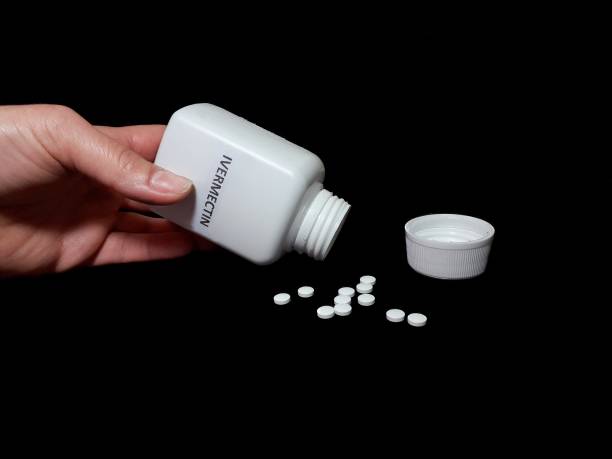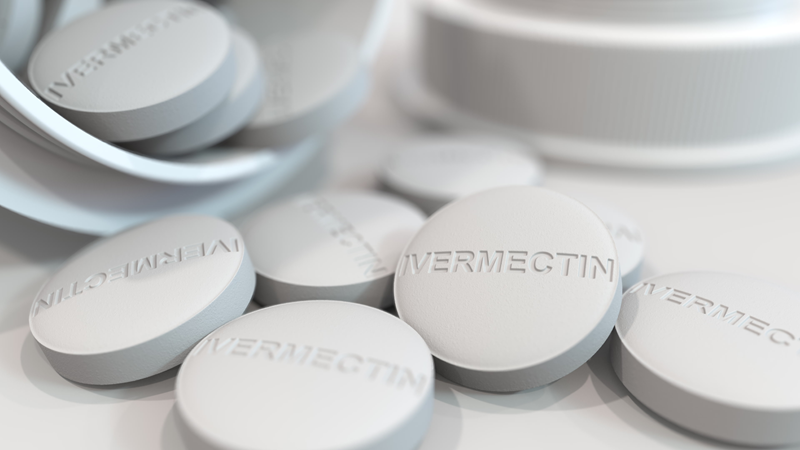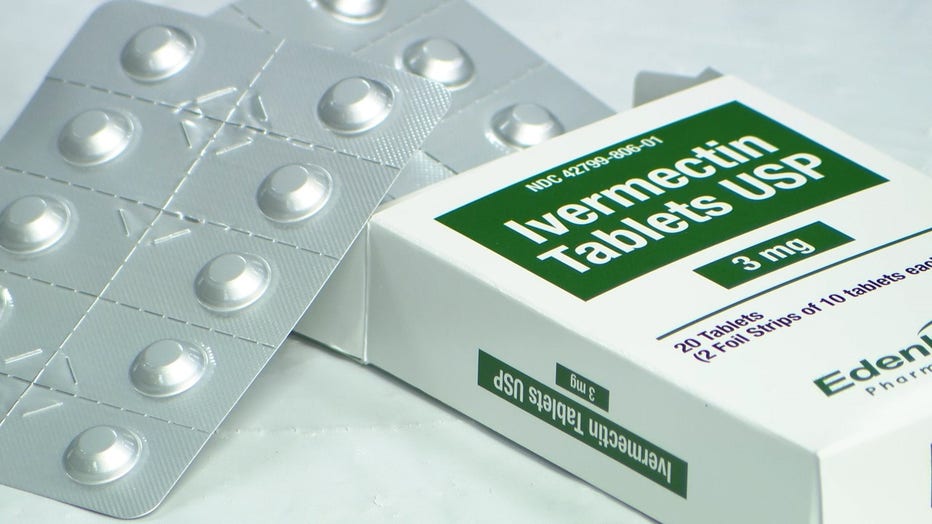Ivermectin belongs to the Anthelmintics class of drugs and is sold under different brand names including Stromectol, Soolantra and Sklice. The antiparasitic drug Ivermectin (oral tablets) is used to treat onchocerciasis (river blindness), strongyloidiasis, enterobiasis, trichuriasis and ascariasis. Topical Ivermectin is applied externally for the treatment of certain skin conditions and head lice infestation.
What are Anthelmintics?

As mentioned above, Ivermectin is an Anthelmintic drug. Anthelmintics medications kill helminths. Helminths are infection-causing worms such as parasites including roundworms, tapeworms and flukes. Anthelmintics are selectively toxic to the parasite, not the host.
Some Anthelmintics work by impeding metabolic processes that are necessary to the parasite but not to the host. Other Anthelmintics are poorly engrossed through the gut which means the parasite is bare to much higher concentrations of Anthelmintic than the host. That results in malnourishment or paralysis of the parasite followed by ensuing removal or digestion.
All You Need To Know About Ivermectin Against Covid-19
With the arrival of the Covid-19 pandemic in 2020, Ivermectin began harvesting disrepute due to off-label use of this drug for the prophylaxis and treatment of Covid-19. While studies to evaluate the effectiveness and safety of Ivermectin for Covid-19 are still ongoing, most of the evidence relies on pre-print in vitro data and the clinical utility of these records remains unclear.
Due to several factors such as the quite low number of patients per trial and the quickness of the conducted trials, the studies on the use of Ivermectin against Covid-19 have been troubled with statical errors and indictments of plagiarism.
Additionally, the use of combined patient data in large-scale meta-analyses as contrasting to the individual patient data (IPD) has been shown to mask otherwise blatant data faults, such as extreme terminal digit bias and the repetition of patient records block.
Until superior and peer-reviewed data about the safety and efficacy of ivermectin against covid-19 becomes available, people should avoid using Ivermectin for these purposes. Talk to your doctor or healthcare provider regarding before taking any prescription medication including Ivermectin to treat or prevent Covid 19 disease.
Before Taking Ivermectin

Don’t use Ivermectin if you are allergic to Ivermectin or other ingredients in the Ivermectin drug. To make sure Ivermectin is safe for you, inform your doctor if you have liver disease, kidney disease, HIV or AIDS, cancer or you are suffering from any other condition that can weaken your immune system.
Tell your doctor if you are pregnant or trying to get pregnant before starting any treatment including Ivermectin treatment. It is not known whether Ivermectin can harm an unborn baby or not still it is better to consult your doctor.
Ivermectin can pass into breast milk and may harm a nursing baby so make sure your doctor knows if you are breastfeeding your baby. Also, do not give Ivermectin to children who weigh less than 33 pounds (15 kg).
Ivermectin treatment should be cautious for elderly and younger patients. Generally, elderly patients should be treated cautiously reflecting the higher frequency of decreased hepatic, renal, or cardiac function and of concomitant disease or any other drug therapy.
Tell your doctor about any medications, herbal supplements or vitamins you are taking as Ivermectin may interact with certain medications and ingredients. Your doctor needs to adjust your medications carefully to avoid possible drug interactions.
Pharmacodynamics of Ivermectin Tablets
Ivermectin is a semi-synthetic antiparasitic drug derived from avermectins. Avermectins are a class of highly active broad-spectrum antiparasitic agents secluded from the fermentation products of Streptomyces avermitilis. Ivermectin is a mixture of two avermectins.
Ivermectin is an avermectin, a group of pentacyclic sixteen-membered lactones (a macrocyclic lactone disaccharide) derived from the soil bacterium Streptomyces avermitilis.
Mechanism of Action
Ivermectin binds particularly and with high like-mindedness to glutamate-gated chloride ion channels in nerve cells and invertebrate muscle of the microfilaria. This binding results in increased permeability of the cell membrane to chloride ions and results in hyperpolarization of the cell causing paralysis and death of the parasite.
Ivermectin is also thought to act as an agonist of the neurotransmitter gamma-aminobutyric acid (GABA) disrupting GABA-medicated central nervous system heterosynaptic transmission. Ivermectin may also weaken the normal intrauterine development of O. volvulus microfilariae and may constrain their release from the uteri of gravid female worms.
The peak effect of Ivermectin is visible in 3 to 6 months in the case of onchocerciasis treatment and 3 months in the case of Strongyloidiasis. Ivermectin does not cross the blood-brain barrier in the body. The half-life period of Ivermectin is 18 hours and the drug is excreted through feces and urine.
Ivermectin is metabolized in the liver and Ivermectin and its metabolites are eliminated almost exclusively in the feces over 12 days approximately with less than 1% of administered dose excreted through the urine.
Route of Administration

Ivermectin is available as an oral tablet that needs to be swallowed by mouth with a glass of water. Ivermectin cream and lotion need to be applied externally.
Absorption of Ivermectin Tablets
Ivermectin tablets are moderately well absorbed. The drug has improved absorption with high-fat meals.
What Are The Ingredients In Ivermectin?
Active Ingredient
The active ingredient in Ivermectin tablets is Ivermectin.
Inactive Ingredients
The inactive ingredients of Ivermectin are Silicone Dioxide, Croscarmellose Sodium, Magnesium Stearate, Cellulose, Microcrystalline, Starch, and Corn.
Ivermectin is considered a safe ad effective drug in the US if used cautiously. The active compounds moxidectin and ursodiol bind to the Ommatidyl transferase that converts ursodiol to moxidectin. This process results in the inhibition of the growth of the parasite.
Ivermectin is also an antifungal drug used with or without Stromectol. The antifungal class of drugs is made of four extremely effective drugs including ketoconazole, azithromycin, doxycycline and minocycline.
What Conditions Can Be Treated With Ivermectin?
Ivermectin possesses antimetabolite activity against certain members of the bacteria family called gram-positive cocci, which are responsible for causing certain types of food poisoning. Ivermectin can be used to effectively treat various parasitic infections including river blindness disease, threadworm infestation, roundworm infestation, whipworm infestation, tropical eosinophilia, filariasis also called elephantiasis and loiasis.
Ivermectin is most commonly used to treat infections caused by worms. Ivermectin kills these parasites rapidly without any considerable side effects. Ivermectin is remarkably effective against intestinal worms because of its efficiency to eradicate these worms.
Ivermectin is also prescribed as an oral treatment for ectoparasitic infections including mite infestation (scabies) and lice infestation. Some off-label uses of Ivermectin include the treatment of diseases linked with Demodex mites including demodicosis and blepharitis.
Onchocerciasis
The evaluation of Ivermectin treatment against onchocerciasis is based on the outcomes of clinical studies involving 1278 patients. A double-blind, placebo-controlled study was performed involving adult patients suffering from moderate to severe onchocercid infection. Patients who received a single dose of ivermectin (150 mcg/kg) experienced an 83.2% and 99.5% decrease in skin microfilariae count in 3 days and 3 months respectively.
Dosage of Ivermectin
Usually, Ivermectin is prescribed as a single-dose treatment. Some patients may need to repeated doses every 3, 6 or 12 months. The exact dosage of Ivermectin depends on the condition that needs to be treated and its severity, the body weight and age of the patients etc.
The dosage of Ivermectin is controlled by the patient’s body. People suffering from heart disease, kidney disease, diabetes, liver disease or stroke may need a higher dose of Ivermectin as they have an amplified risk of high cholesterol and high blood pressure.
In mass distribution campaigns in international treatment programs the most commonly prescribed dose interval is 12 months. For treating individual patients, retreatment may be suggested as the shortest interval of 3 months.
Typical Ivermectin dose is 150 mcg/kg of body weight when prescribed as a single dose. Maximum recommended human dose is 200 mcg/kg of body weight for adults when taken as a single dose. Make sure you follow the dosage guidelines recommended by your doctor or healthcare provider.
How To Use Ivermectin?

Ivermectin is classified as a preventative medication and it works to protect against infection by averting the growth of nematodes in the gastrointestinal tract. Naturally, a human body can only absorb so much medication before it requires to be destroyed its own enzymes.
It is suggested to take Ivermectin tablets orally by mouth. Swallow the tablet with a full glass of water on an empty stomach at least two hours before or after a meal. Apply the topical forms of Ivermectin externally only, do not put them in the eyes or mouth.
Never take Ivermectin medication in larger amounts or for longer than suggested by your health care professional. Correctly follow the directions mentioned on your prescription label. Some patients may need to take the Ivermectin dose again several months or a year after the first dose in order to treat the infection effectively.
Patients with a weak immune system due to a disease or using certain medications may need to take multiple doses of Ivermectin. Some patients with weak immune systems also need to take Ivermectin regularly. To make sure Ivermectin is working well, you may need to provide regular stool samples to verify eradication of infection.
Where To Buy Ivermectin For Humans?
Make sure you buy Ivermectin for humans from reliable sources. Ivermectin is being used to treat Coronavirus in the US so it is extremely important to buy this drug from a suitable pharmacy. The best option to buy Ivermectin for humans quickly and at cheap rates is to buy it from an online pharmacy.
Ivermectin is available without a prescription or through online consultation from online pharmacies and healthcare providers in the US, Australia, Europe and Canada. Ivermectin is accessible in different forms such as Ivermectin tablets, film-coated tablets for oral administration and injectable tablets for intravenous administration.
Ivermectin capsules are available in the US. Ivermectin tablets come in various dosages including Ivermectin 3 mg, Ivermectin 6 mg and Ivermectin 12 mg. Usually, a higher dose of Ivermectin is preferred for the treatment of severe strongyloidiasis but such cases occur rarely.
Ivermectin For Eye Infection Treatment
In humans, Ivermectin is used for the treatment of the ocular disease of chronic cholestasis. This disease is caused by chronic, recurring and relapsing inflammation of eye membranes. Ocular infection of Chlamydia bacteria occurs when the infection spreads from the eyelids to the eyeballs causing a corneal ulcer.
The bacteria causes severe inflammation of the cornea causing vision loss. Doctors use antibiotic pills such as tetracyclines for around a month in order to treat Chlamydia. Then Ivermectin and other drugs are administered to ease the pain.
This treatment takes 5-6 weeks to clear up the Chlamydia infection. The antibiotics along with Ivermectin destroy the infection-causing bacteria. Once the infection is cleared, the corneal ulcer also heals. With a lack of proper treatment, patients may also die from this infection.
Ivermectin In Combination With Other Medicines

Ivermectin is considered to be extremely effective when taken in combination with certain other pharmaceuticals including corticosteroids, steroids and antibiotics. However, some of these drugs may cause undesired adverse effects, so it is suggested to discuss the suitable combination before beginning with the treatment.
Moreover, a few common drugs may cause undesired side effects if you take them with too low or too high doses of Ivermectin. Commonly the combination treatment of these drugs is prescribed as a part of a full-dose regimen. For example, you may be prescribed doxycycline (antibiotic) which is typically given as two separate medications in a full-dose regimen.
In such cases, it may not provide adequate protection against parasites as the first medication may have the desired effect while the second medication may have little effect. The prescribed medication depends on individual conditions.
Ivermectin is particularly advantageous for people with high levels of triglycerides and high blood cholesterol. That is why Ivermectin should not be used in combination with beta-blockers or other similar kinds of medications. Ivermectin tablets may be used when other medications are not effective because of their interactions with Ivermectin toxicity.
What Do Studies Say About Ivermectin For Covid-19 Treatment?

Currently, Ivermectin is being investigated in clinical trials as a potential treatment for the coronavirus SARS-CoV-2 Virus. FDA (US Food and Drug Administration) has not approved Ivermectin for treating or preventing Covid 19 in humans. WHO (World Health Organization) advise people not to use Ivermectin in patients with Covid 19 to diminish viral replication unless they are registered in clinical trials.
Experimental studies have been performed to assess Ivermectin as an aide treatment for the antiviral effects of hospitalized covid 19 patients (adults) through randomized multi-Centre clinical trials. Currently, there is insufficient evidence from the Covid 19 Treatment Guidelines Panel to recommend for or against the use of Ivermectin in Covid-19 patients with mild or severe symptoms.
Centers for Disease Control and Prevention (CDC) has reported an increase in adverse effects linked to Ivermectin misuse and overdose in the past few years. In some cases, people have used veterinary formulations intended for large animal use such as cattle, sheep and horses. These products are highly concentrated and result in overdoses when taken by humans.
Allergic And Inflammatory Responses Of Ivermectin

Mazzotti Reactions
Microfilaricidal drugs like Diethylcarbamazine Citrate might cause a cutaneous and systemic reaction of fluctuating severity (Mazzotti reaction) and ophthalmological reactions in patients suffering from onchocerciasis.
Probably these reactions occur due to allergic and inflammatory responses to the death of microfilariae. Onchocerciasis-treated patients may experience these kinds of reactions in addition to other clinical adverse reactions that are possibly associated with the drug itself.
The treatment of severe Mazzotti reactions is not imperiled to controlled clinical trials. Oral hydration, recumbency, intravenous normal saline and parenteral corticosteroids have been used to treat postural hypotension, and antihistamines and aspirin have been used for many mild to moderate cases.
Neurotoxicity with Ivermectin use, including changes of consciousness of varying severity (stupor, coma, and drowsiness) confusion, disorientation and even death has been reported in patients without onchocerciasis and patients with onchocerciasis in the absence of Loa loa infection. These reactions have been generally resolved with supportive care and termination of therapy.
In onchocerciasis clinical trials involving 963 adult patients treated with Ivermectin dose 100 to 200 mcg/kg, worsening of the following Mazzotti reactions reported during the first 4 days after treatment. Arthralgia/synovitis (9.3%), cervical lymph node enlargement (5.3%), axillary lymph node enlargement (5.3%), inguinal lymph node enlargement and tenderness (12.65 and 13.9& respectively).
Loiasis
In rare cases, patients suffering from onchocerciasis and also severely infected with Loa loa may develop a thoughtful or even fatal encephalopathy either naturally or following treatment with an effective microfilaricide.
The adverse experiences reported in these patients are neck and back pain, dyspnea, red eye, conjunctival hemorrhage, mental status changes, difficulty in standing or walking, urine and fecal incontinence, confusion, stupor, lethargy, seizures or coma.
This syndrome has been seen hardly following the Ivermectin use in individuals who permit treatment with Ivermectin drug for any reason and have had noteworthy exposure to Loa loa endemic areas of West or Central Africa, carry out pretreatment assessment for loiasis and cautious post-treatment follow-ups.
Clinical Adverse Reactions Possibly Occur During Pregnancy And Lactation
Epidemiological studies during pregnancy are inadequate to inform a drug-associated risk of adverse developmental consequences because either the timing of administration during gestation was not precisely determined or the administration happened only during the second trimester of pregnancy. However systemic exposure from topical use of ivermectin is reported much lower than from oral use.

In animal reproductive studies, Ivermectin tempted adverse developmental consequences when the drug was administered orally to pregnant mice, rabbits and rats during the period of organogenesis only at or near doses that were maternally toxic to pregnant females.
No information is available regarding the presence of Ivermectin in human milk in 4 lactating women after a single oral dose (150 mcg/kg) of Ivermectin. However, the information from this study is not sufficient to ascertain the effects of Ivermectin on breastfed infants or on milk production.
As per reported clinical experience topical Ivermectin exposure is much lower than that of oral Ivermectin However the amount of Ivermectin present in breast feed after topical application has not been well studied. The developmental and other health benefits of breastfeeding should be considered along with the lactating women’s clinical necessity for therapy and any potential adverse effects on nursing babies from the underlying maternal condition.
Treatment of pregnant women and breast feeding mothers should only be undertaken using Ivermectin when the chances of delayed treatment to women outweighs the possible risk to the fetus and nursing baby respectively.
Can Ivermectin Cause Allergic Reactions?
Some people are allergic to Ivermectin, so make sure you tell your doctor if you are allergic to Ivermectin. Also, read the drug information carefully before using any medication. It’s totally fine if you are allergic to any medication, food or any other substances.
Many people who are allergic to Ivermectin have other food allergies. Some foods that can cause an allergic reaction to Ivermectin include eggs, liver, fish and oysters.
Possible Side Effects Of Ivermectin Tablets
Ivermectin can efficiently help clear up various infections in humans however it may cause some kind of side effects in certain cases. Most patients experienced mild side effects of this drug such as abdominal pain, diarrhea and lightheadedness.
Accidental intoxication or significant exposure to veterinary formulations by ingestion, injection or inhalation can cause adverse effects such as rash, headache, edema, asthenia, dizziness, nausea, diarrhea and vomiting.
Patients may experience various side effects while using Ivermectin. Some common side effects include nausea, vomiting, fatigue, diarrhea, loss of appetite, headache, dizziness and rash. In case you experience any unusual or prolonged side effects immediately contact your healthcare provider.
